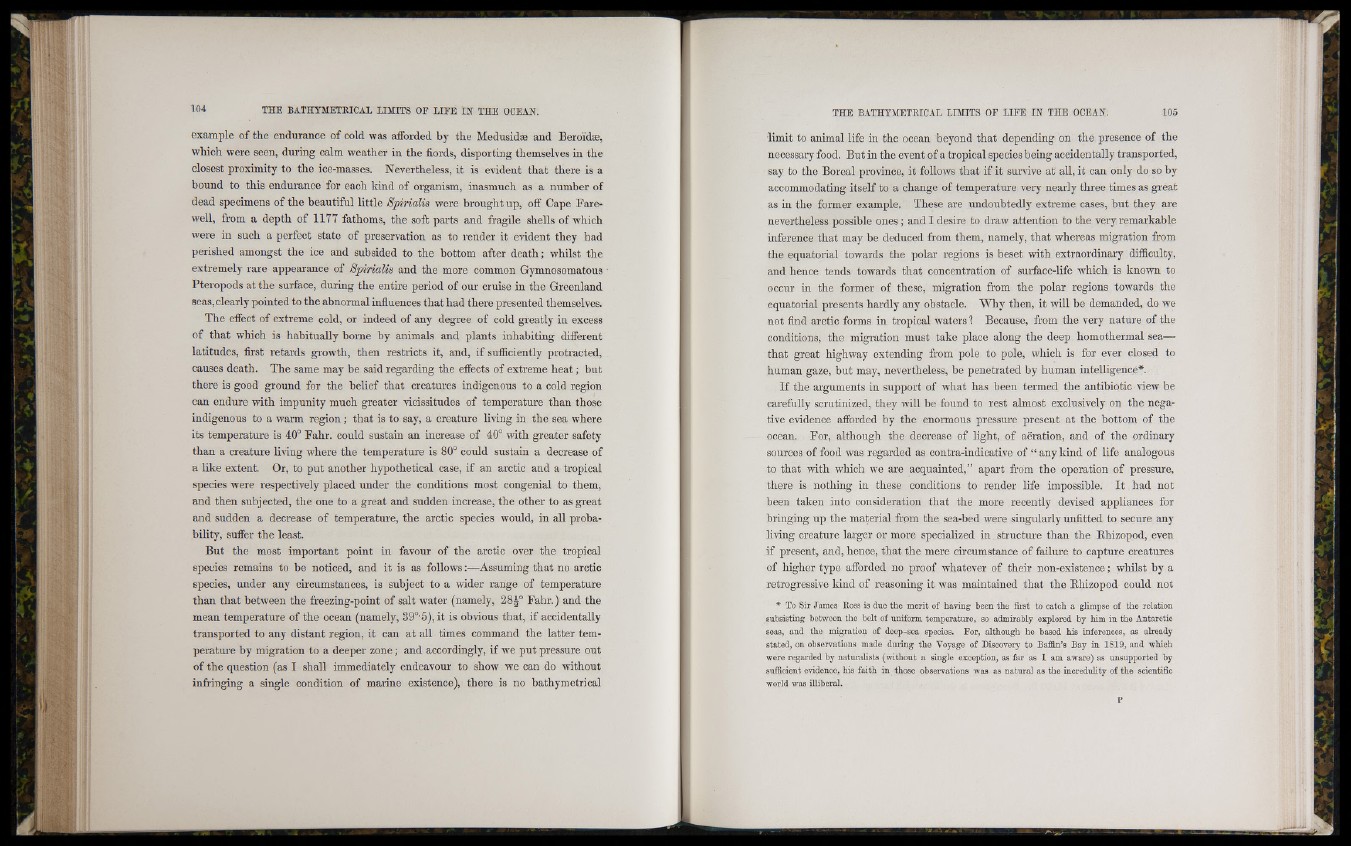
example of the endurance of cold was afforded by the Medusidce and Beroid®,
which were seen, during calm weather in the fiords, disporting themselves in the
closest proximity to the ice-masses. Nevertheless, it is evident that there is a
bound to this endurance for each kind of organism, inasmuch as a number of
dead specimens of the beautiful little Spinalis were brouglit up, off Cape Farewell,
from a depth of 1177 fathoms, the soft pai'ts and fragile shells of which
were in such a perfect state of preservation as to render it evident they had
perished amongst the ice and subsided to the bottom after death ; whilst the
extremely rare appearance of Spirialis and the more common Gymnosomatous
Pteropods at the surface, during the entire period of our cruise in the Greenland
seas, clearly pointed to the abnormal influences that had there presented themselves.
The effect of extreme cold, or indeed of any degree of cold greatly in excess
of that which is habitually borne by animals and plants inhabiting different
latitudes, first retards growth, then restricts it, and, if sufficiently protracted,
causes death. The same may be said regarding the effects of extreme heat ; but
there is good ground for the belief that creatures indigenous to a cold region
can endure with impunity much greater vicissitudes of temperature than those
indigenous to a warm region ; that is to say, a creature living in the sea where
its temperature is 40° Fahr. could sustain an increase of 40° with greater safety
than a creatine liring where the temperature is 80° could sustain a decrease of
a like extent. Or, to put another hypothetical case, if an arctic and a tropical
species were respectively placed under the conditions most congenial to them,
and then subjected, the one to a great and sudden increase, the other to as great
and sudden a decrease of temperature, the arctic species would, in all probability,
suffer the least.
But the most important point in favour of the arctic over the tropical
species remains to be noticed, and it is as follows :—Assuming that no arctic
species, under any circumstances, is subject to a wider range of temperature
than that between the freezing-point of salt water (namely, 28^° Fahr.) and the
mean temperature of the ocean (namely, 39°-5), it is obvious that, if accidentally
transported to any distant region, it can at all times command the latter temperature
by migration to a deeper zone ; and accordingly, if we put pressure out
of the question (as I shall immediately endeavour to show we can do without
infringing a single condition of marine existence), there is no bathymetrical
limit to animal life in the ocean beyond that depending on the presence of the
necessary food. But in the event of a tropical species being accidentally transported,
say to the Boreal province, it follows that if it surrive at all, it can only do so by
accommodating itself to a change of temperature very nearly three times as great
as in the former example. These are undoubtedly extreme cases, but they are
nevertheless possible ones; and I desire to draw attention to the very remarkable
inference that may be deduced from them, namely, that whereas migration from
the equatorial towards the polar regions is beset with extraordinary difficulty,
and hence tends towards that concentration of surface-life which is known to
occur in the former of these, migration from the polar regions towards the
equatorial presents hardly any obstacle. Why then, it will be demanded, do we
not find arctic forms in tropical waters 1 Because, from the very nature of the
conditions, the migration must take place along the deep homothermal sea—
that great highway extending from pole to pole, which is for ever closed to
human gaze, but may, nevertheless, be penetrated by human intelligence*.
If the arguments in support of what has been termed the antibiotic view be
carefully scrutinized, they will be found to rest almost exclusively on the negative
evidence afforded by the enormous pressui’e present at the bottom of the
ocean. For, although the decrease of light, of aeration, and of the ordinary
sources of food was regarded as contra-indicative of “ any kind of life analogous
to that with which we ai*e acquainted,” apart from the operation of pressure,
there is nothing in these conditions to render life impossible. I t had not
been taken into consideration that the more recently devised appliances for
bringing up the material from the sea-bed were singularly unfitted to secure any
living creature larger or more specialized in structure than the Rhizopod, even
if present, and, hence, that the mere circumstance of failure to capture creatures
of higher type afforded no proof whatever of their non-existence; whilst by a
retrogressive kind of reasoning it was maintained that the Rhizopod could not
* To Sir James Ross is due the merit of having been the first to catch a glimpse of the relation
subsisting between the belt of uniform temperature, so admirably explored by him in the Antarctic
seas, and the migration of deep-sea species. For, although he based his inferences, as already
stated, on observations made dm-ing the Yoyage of Discovery to Baffin’s Bay in 1819, and which
were regarded by naturalists (without a single exception, as far as 1 am aware) as unsupported by
sufficient evidence, his faith in those observations was as natural as the incredulity of the scientific
world was illiberal.